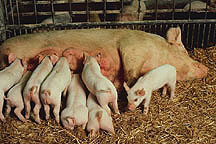This page has been archived and is being provided for reference purposes only. The page is no longer being updated, and therefore, links on the page may be invalid.
|
|
Phages Eyed as New Way to Control Salmonella
By Alfredo Flores
April 28, 2006
Agricultural Research Service (ARS) scientists and university cooperators have collected and partially characterized beneficial viruses, called bacteriophages, that could help control Salmonella bacteria in swine waste lagoons.
Disease caused by Salmonella costs pork producers an estimated $100 million annually. Reports of human outbreaks of salmonellosis linked to pork consumption are rare, but the U.S. Centers for Disease Control and Prevention estimate that foodborne outbreaks of salmonellosis from all sources affect 1.4 million consumers annually.
Mike McLaughlin, a virologist in ARS' Waste Management and Forage Research Unit at Mississippi State, Miss., and collaborators from Western Kentucky University’s Department of Biology in Bowling Green, Ky., have devised and adapted methods to collect, isolate and identify bacteriophages that attack and kill Salmonella strains. Salmonella causes illness in livestock, pets and people, but its hosts often show no signs of disease, complicating detection and control efforts.
Bacteriophages—or "phages," for short—invade bacteria, multiply and eventually rupture bacterial walls, releasing multiple copies of new phages capable of invading more bacteria. Most phages only attack specific species and strains of bacteria. Knowledge of this host- specificity allows specialists in agriculture, medicine and food safety to apply specific phages to help identify, track—and even treat or prevent—bacterial infections.
McLaughlin and his team examined the bacterial host-specificity of the phages found in swine manure and, using electron microscopy, classified the phages according to their unique sizes and shapes. Information from their study will enable scientists to better understand the microbial ecology within swine effluent lagoons. They'll use the phages that have now been characterized to develop new tools to control Salmonella.
This research, part of the ARS national program on manure and byproduct utilization, is reported in this month’s Journal of Environmental Quality, published jointly by the American Society of Agronomy, the Crop Science Society of America and the Soil Science Society of America.
ARS is the U.S. Department of Agriculture's chief scientific research agency.

